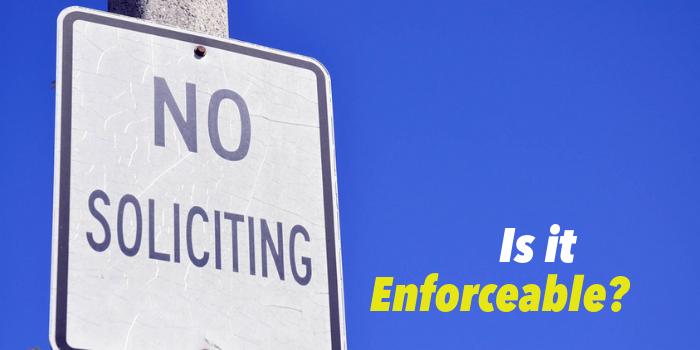It’s Springtime, and homeowners’ associations are particularly attractive communities for commercial, religious, and political solicitors. The close proximity of homes, neatly manicured lawns, and accessible sidewalks lend appeal to neighborhood canvassers. So, what’s a homeowner to do if solicitations are not particularly desired?
Signage is Posted – Is it Actually Enforceable?
Many associations, whether gated or not, post “No Solicitation” signs at the entrance(s) or throughout the community. However, the First Amendment to the U.S. Constitution states that “Congress shall make no law respecting an establishment of religion or prohibiting the free exercise thereof; or abridging the freedom of speech, or of the press; or the right of the people peaceably to assemble, and to petition the Government for a redress of grievances.”
So, what does this mean? It means that the door-to-door salespeople canvassing your community have a constitutional right to be there.
Since 1976, the Supreme Court has upheld free speech for commercial purposes. Now, that doesn’t mean that the homeowner has no right to privacy on their private property. Read on for more information …
The Difference Between Solicitation and Advertising
Typically, solicitation is considered door-to-door selling, which is different from someone leaving advertising material on the door. Hand delivery of advertisements is cheaper than mailing, but it is still a common form of junk mail. Basically, anyone who wants to sell something can use this tactic. There’s not really much the homeowner or HOA can do, except to post signage and call to report frequent or repeat offenders.
What About Local Ordinances?
Varying greatly from place-to-place, local ordinances are typically passed and enforced by municipalities.
There are several examples of local ordinances attempting to ban solicitors altogether, or to regulate them with time constraints and/or permit and registration requirements. However, the Supreme Court has traditionally sided in favor with solicitors. Check out the following cases for more information:
- Watchtower Bible & Tract Society of New York, Inc. vs. Village of Stratton
- Dublirer vs. 2000 Linwood Avenue Owners Inc.
- Ohio Citizen Action vs. City of Englewood
Does it seem like the courts favor solicitors over homeowners? Maybe. However, the reason the Courts have ruled that anti-solicitation ordinances violate the First Amendment is because the decision of whether to listen to a solicitor or not is ultimately the individual homeowners’ decision! A blanket, one-size-fits-all ruling would infringe upon both the solicitor’s rights and the homeowner’s right to listen, purchase, subscribe, be persuaded, etc.
Religious or Non-Charitable Organizations
In some instances, religious organizations have argued that they are not soliciting anything, just trying to share encouragement through scripture. Those who distribute political advertisements could argue that they’re just asking for your vote.
Many local laws exempt political, charitable, and religious groups who are not attempting to sell a product of service, while others state that these canvassers must respect “No Solicitation” signs – it all just depends on where you live! This brings about the argument of distinguishing between solicitation and trespassing.
The Difference Between “No Soliciting” and “No Trespassing”
If a homeowner really wants to avoid the hassle of dealing with bothersome knocks on the door, a “No Trespassing” sign wields more power than “No Solicitation.” If privately owned property, the HOA should be able to ban such activity by non-members under basic trespassing principles.
Non-Gated vs. Private Property
If you reside in an HOA that can only be accessed via private road(s), as is often the case in gated communities, solicitors are technically restricted from entering if “No Solicitation” signs are posted at the entrance(s). Furthermore, local laws may also restrict access to communities that have signage posted at community access points.
How to Keep Solicitors Away
If you are serious about keeping pesky door-to-door salespeople and other solicitors from bothering you at home, you will need to display a “No Soliciting” sign on your property (e.g., front door, yard, and/or window). However, before posting a sign, be sure to check your CC&Rs to see if prior approval is needed, as some HOAs strictly enforce signage rules.
While this is may not be very appealing to homeowners, this is the best way to deter solicitors. The Supreme Court has repeatedly ruled that many laws that restrict solicitation are unconstitutional, though privately posted signs are a legitimate way to tell salespeople and other solicitors to leave you alone. While a salesperson and other types of solicitors may have the right to be in your neighborhood, posting a sign on your individual property prevents them the right to knock on your door or ring your bell because you’ve posted an express desire that they are not welcome on your property for such purposes.
By posting such signage on your property, you are essentially telling those who solicit that they are not welcome on your property and are breaking the law if they do so. While it may not seem like much, this is the best action that you can personally take to deter solicitors. These signs are legally enforceable as means to prevent the homeowner from being disturbed.
If solicitors ignore your posted sign, your knowledge of local laws will help you turn away or prevent any unwanted visitors, although you may still need to report them to local authorities.
For more tips on HOA management, be sure to visit our blog for regular updates. Or if you’re an HOA board member looking for help managing your community, contact Spectrum Association Management today for a free quote.







